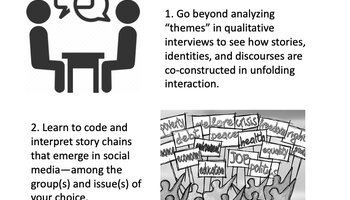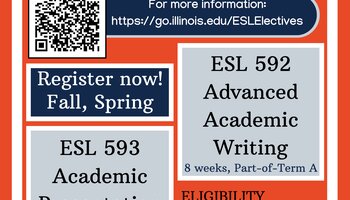We are excited to offer the following courses this upcoming Spring semester:

LING 490: Narrative Analysis
3 undergraduate hours. 4 graduate hours. An advanced course on qualitative research methods in Linguistics with Dr. Anna Mendoza

ESL 592 and ESL 593
ESL 592 Part-of-Term A (POT A, 8 weeks) provides advanced international students with lessons in genre analysis to enable them to derive field-specific models for research articles, theses, and dissertations. During this course, students will develop a guide for academic writing conventions specific to their own discipline. ESL 593 (POT B, 8 weeks) will improve students’ skills in speaking and presenting research in academic settings. With the aim of creating and delivering compelling and professional presentations, students will practice orally explaining their research, adapting to different audiences, and giving and receiving feedback.
LING 413: Corpus Linguistics
3 undergraduate hours. 4 graduate hours. An introduction to computational research methods applied to large natural language corpora (i.e., text analytics) which can uncover complexities in naturally occurring data and explore issues related to frequency of usage. Students will learn the computational skills necessary to build, validate, and analyse corpora with the goal of both exploring linguistic phenomena and testing linguistic theories. With Dr. Jonathan Dunn.
LING 413: Corpus Linguistics
3 undergraduate hours. 4 graduate hours.
An introduction to computational research methods applied to large natural language corpora (i.e., text analytics) which can uncover complexities in naturally occurring data and explore issues related to frequency of usage. Students will learn the computational skills necessary to build, validate, and analyse corpora with the goal of both exploring linguistic phenomena and testing linguistic theories. With Dr. Jonathan Dunn.
LING 448: Introductory Machine Learning
3 undergraduate hours. 4 graduate hours.
Machine learning has been thriving in many areas for both research and industry. It offers solutions to problems that traditional approaches may not be able to deal with or fall short in efficiency. From unsupervised to supervised learning, this course provides a broad understanding of modern machine learning methods and techniques. Knowledge and skills are acquired in solving practical problems in clustering and classification, using techniques such as k-means, Gaussian mixture models, decision trees, support vector machines, and neural networks. With Dr. Yan Tang.
LING 514: Design and Methodology in Linguistic Research
4 graduate hours.
This course introduces students to a quantitatively oriented approach to research design and methodology in language study, with emphasis on the construction of appropriate research designs for different subfields of linguistics (with a particular focus on designs for research in syntax/semantics and language acquisition / bilingualism). A variety of research methods are covered in detail, including both offline and online methodologies. Students will 1) gain familiarity with different types of quantitative data collection methods used in experimental linguistic research, 2) be able to design experimental materials for research questions in language acquisition and syntax/semantics, and 3) be able to evaluate the research designs reported for published studies. This course satisfies the Stage 1 methodology requirement of the Linguistics PhD, as well as the research methods requirement for SLATE. With Dr. Tania Ionin.
LING 541: Syntax II
4 Graduate hours.
In this course we will discuss in greater depth some of the current thinking in the field within a few key areas: Locality, Agreement and Concord, Interfaces of Syntax with Semantics, Morphology and Phonology. We will read both overview chapters, as well as recently published articles in these areas, to get you ready to participate with your own work in the current discussions and follow other work on these topics. With Dr. Aida Talic.
LING 547: Formal Semantics II
4 Graduate hours.
This course continues developing formal semantic theory for natural languages, to include topics not covered in LING 507 – Formal Semantics I, especially intensionality, modal predicates, predicates of mental attitude, tense, aspect, Aktionsart, and questions. The course also makes the transition from a textbook/exercises/exams-based format to a research-paper-based format. With Dr. Peter Lasrsohn.
LING 560: Seminar in Bilingualism
4 graduate hours.
This seminar covers key issues, concepts and debates in the field of bilingualism and highlights the creativity and complexity of code-switching drawing on a wealth of data from a wide variety of contemporary contexts, including transnational and indigenous communities in the global North and South; popular music; social media and digital communication; semiotic landscapes and advertising. Ultimately, the goal of this seminar is to present a framework that helps us to explore and think more deeply about why code-switching matters, in terms of how various creative and complex forms of code-switching communicate meaning and organize social relations and actions in late modernity. Furthermore, it provides students with analytic tools to analyse code-switching as a multilingual sign and its relationship to various identity-positions in contemporary society. With Dr. Bhatt.
LING 588: Advanced Analytical Methods for Linguistic Research
4 graduate hours.
This course offers an overview of advanced analytical methods relevant to linguistic research. The emphasis will be on a critical evaluation of current methodologies, with a focus on scientific reproducibility and transparency. As a prerequisite, students are expected to be familiar with basic statistical terms and inferential statistics. The course will utilize the R software environment for teaching. With Dr. Wenyue Ma.